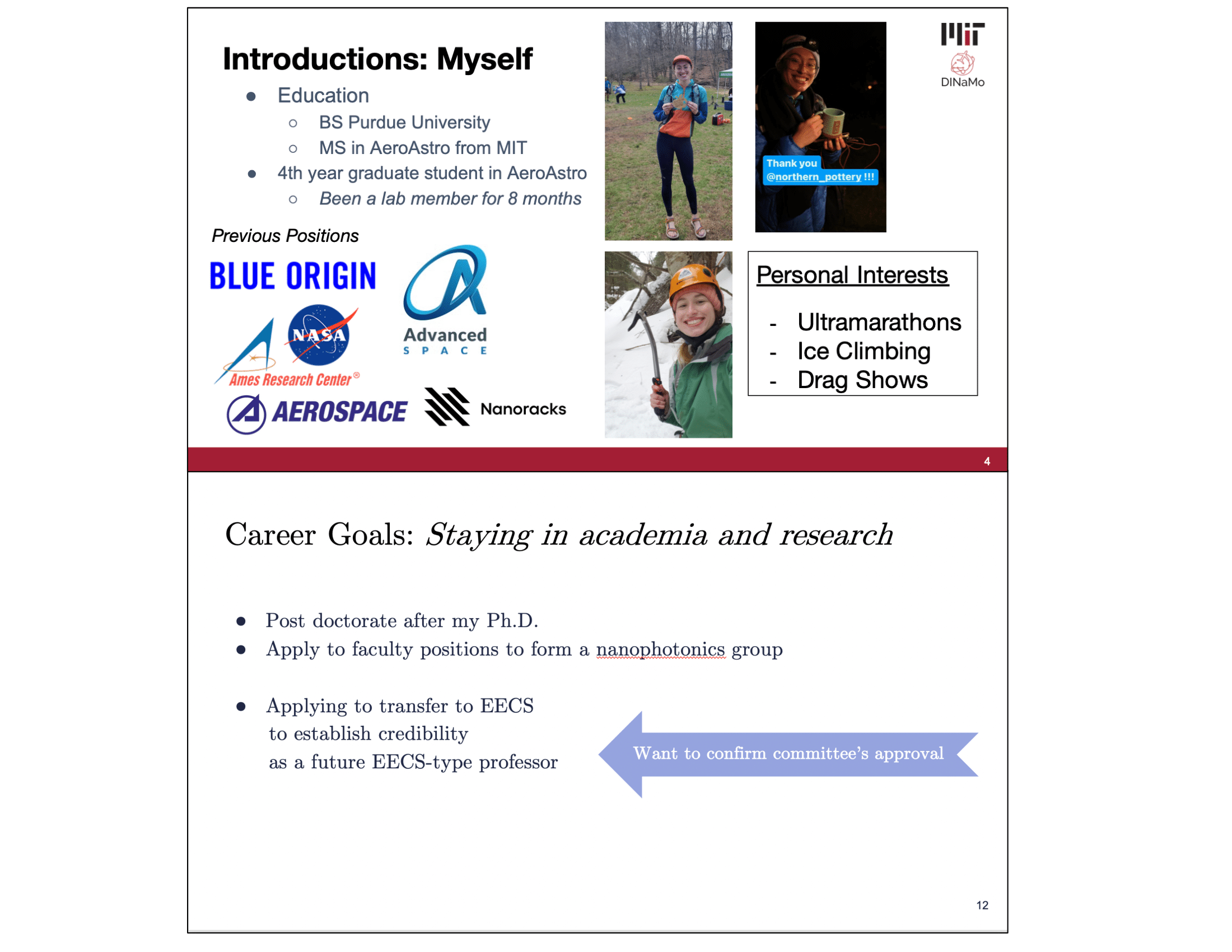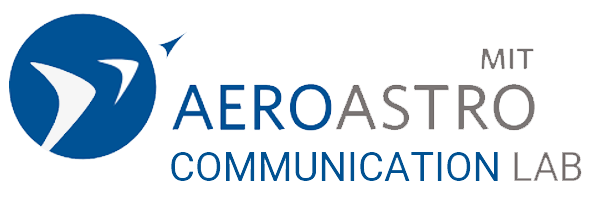1. Introduction
The purpose of this CommKit is to demystify the contents and expected deliverables for your first PhD Committee Meeting. After reading this document, you will know what your committee members are expecting from you when they show up to this first meeting.
2. Criteria for Success
Preparing for the committee meeting, you have already done the following.
- Formed your committee, composed of at least three committee members: your thesis advisor, your thesis committee chair, and another thesis committee member. For AeroAstro, two of these members must be MIT faculty.
- Created a presentation for the committee meeting, comprising slides explaining your assessment of what gaps exist in your expected PhD research area, a summary of your work in this area so far, and your coursework thus far in graduate school.
- Reviewed the presentation with your advisor to ensure the content is in line with their expectations for the first committee meeting. If possible, you can ask your advisor for their slide expectations before you start creating your presentation.
During the committee meeting itself, you will:
- Introduce your committee members to your proposed PhD topic. You will also introduce your committee members to one another.
- Establish your expectations for your committee members on the sort of help, feedback, and meeting frequency you would like to have for the rest of your PhD.
3. Purpose
Your first committee meeting is the first time that your committee members are formally introduced to your PhD topic and your understanding of the area. Of lesser importance but still good to keep in mind, is that this meeting also be the first time your committee members meet one another. For many students, the first committee meeting serves as a dress rehearsal for the PhD proposal. Therefore, the first committee meeting is a great opportunity to get feedback from your committee members about research progress or ideas that you think will be in your proposal.
4. Analyze Your Audience
Your committee members may be familiar with only one component of your PhD topic (i.e. the methodology but not necessarily the application). As a result, you will have to balance going into very thorough technical detail for the subject matter experts on your committee, but also providing a high-level context to your other committee members.
However, the focus of the meeting should be to provide a thorough, technical update on your understanding of the state-of-the-art and where the gaps in the field lie. As a result, the majority of your topic slides should be explanations of comparable works as well as what specific techniques and results you have in your own research in this area. If you are planning to do your proposal defense after your first committee meeting, this is an opportunity to get feedback on your planned PhD contributions as well as your initial research direction.
5. Best Practices
5.1. Explain your background and the skillsets of your committee members
Before you dive into your technical topic, take some time to explain your personal background. This could be your hobbies, where you went to school, where you grew up. If you haven’t worked with any of your committee members before, this is their first introduction to you as a person. As a result, you should take some time to explain who you are and any relevant career goals you have so that your committee members can best understand how to help you.

Figure 1: An example introductions slide is shown on the left. This slide is more informal in tone, as it mentions the students personal interests, and has photos taken from outside the lab. An example career goals slide is shown on the right. This slide deck had a much more formal tone, and is clearly stating the student’s intentions following a PhD. By making the career goals slide a stand-alone slide, the student is opening a discussion with their committee about what they want as an outcome of their PhD.
Additionally, your committee members may not have worked with one another before. As a result, you should provide a brief overview of their background and core competencies. This does not have to be a deep-dive into the background and accolades of your committee members; a brief bullet that explains their specialties will suffice. This will help your committee members understand their role on the committee and which person is most knowledgeable in each piece of your PhD.
5.2. Describe the state-of-the-art of the field and your differences from other approaches
The focus of your first committee meeting is to establish that you’ve thoroughly researched the field to find a gap in current work that can serve as your proposed PhD thesis topic, so you will need to demonstrate an advanced understanding of the current state of the field. As your first committee meeting is a presentation rather than a document, the review of the field should not necessarily be a systematic review of every paper out there. Instead, focus on synthesizing commonalities between your approach and others, and the weaknesses in these other methodologies. If there are one or two works that are going to serve as baselines that you will improve upon, then it is worthwhile to highlight these approaches and explain them in more detail.
5.3. Provide timelines for your anticipated milestones for your PhD.
Following your description of the state of the field and your research, you should cover housekeeping items related to the progression of your degrees. This should include the classes you intend to take (or have taken) in support of your degree, as well as when you plan to propose your PhD topic and when you would like to have the next committee meeting. It is important to cover your expectations for committee meeting frequency in this first committee meeting, so that your committee meeting members understand the kind of support that you will need throughout this process.
5.4. Answer questions surrounding your work
Following your presentation, it is customary that your committee will ask you questions about the direction of your work and the results you have presented. You should be able to explain the assumptions and experimental setup. For questions you are unable to answer, it is always fine to be honest with your committee and reply that you have not heard of a resource/method they are mentioning. If there are areas that you want specific feedback on, focus on asking detailed, thorough questions. When asking your committee for feedback or input, avoid asking them questions like “what should I do next”, or treating the committee meeting as a group brainstorming session. For example, a better alternative question for them would be that you have researched a specific set of methodologies, and you would like their input on what they think is most applicable for your problem. It is expected that you will define the direction of your PhD and complete a thorough enough literature review to be able to confidently assess the gaps in the field. Your committee serves to help you find resources to complete your experiments or techniques they may think are suitable for your approach. Your committee will not tell you what to do verbatim for your PhD, that is up to you to decide and defend.
